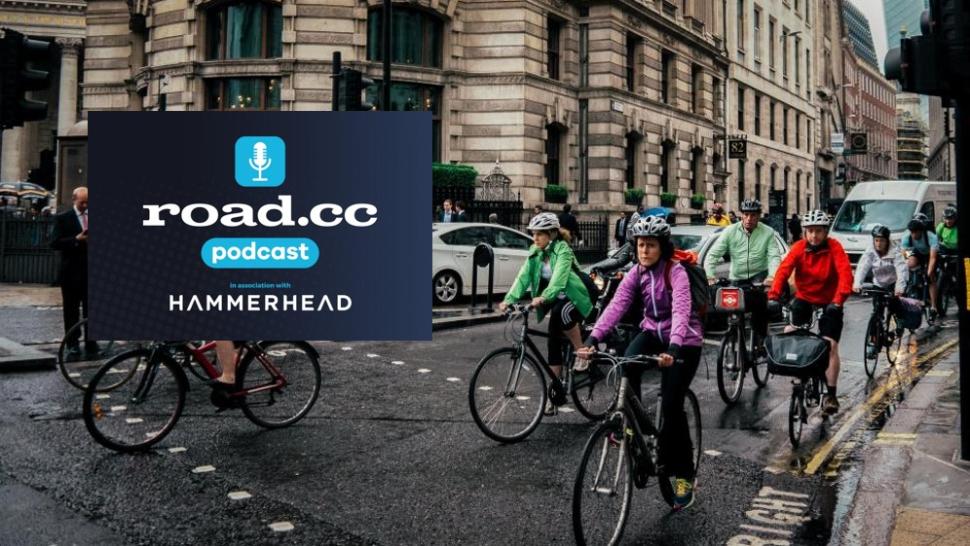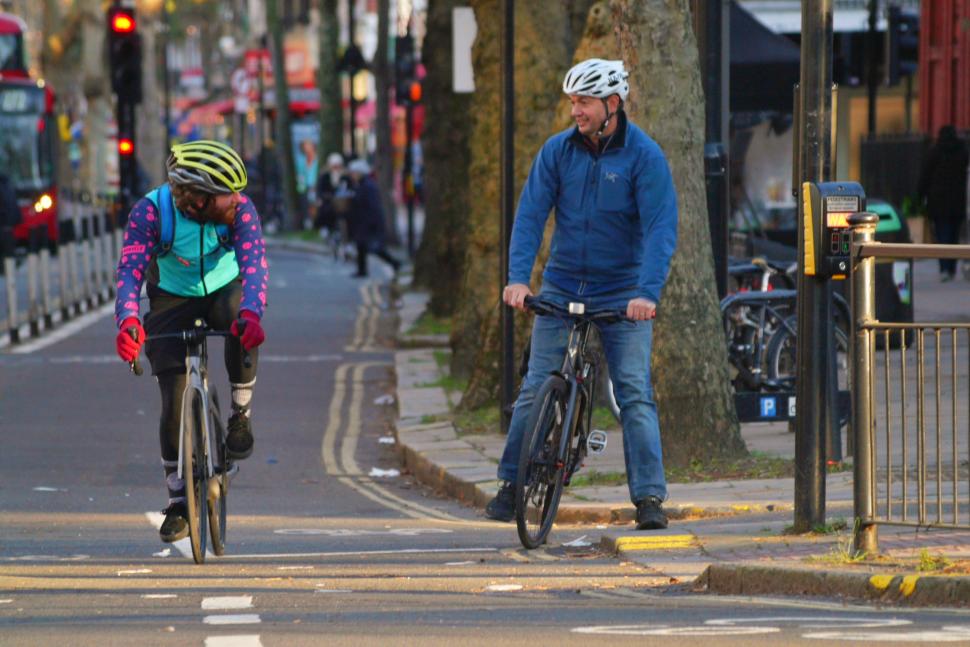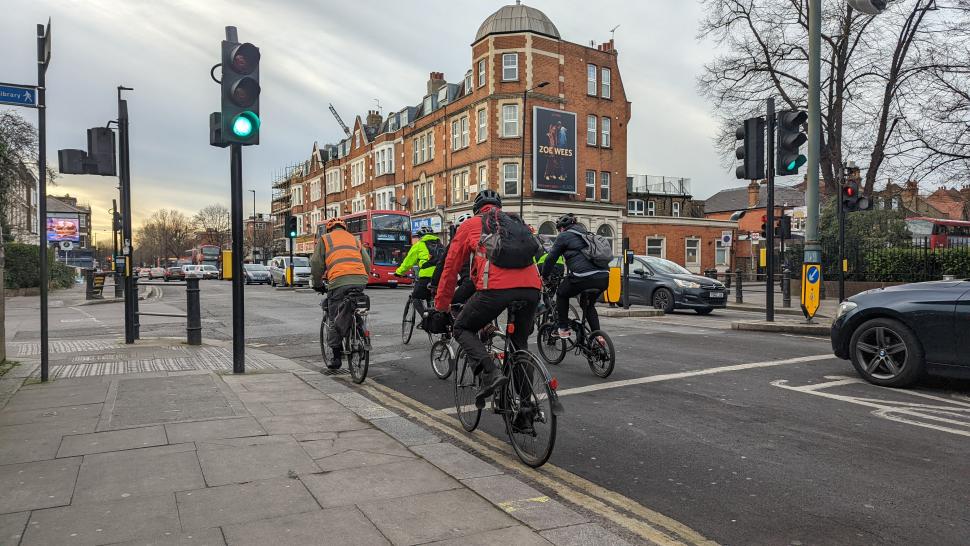- News
- Reviews
- Bikes
- Components
- Bar tape & grips
- Bottom brackets
- Brake & gear cables
- Brake & STI levers
- Brake pads & spares
- Brakes
- Cassettes & freewheels
- Chains
- Chainsets & chainrings
- Derailleurs - front
- Derailleurs - rear
- Forks
- Gear levers & shifters
- Groupsets
- Handlebars & extensions
- Headsets
- Hubs
- Inner tubes
- Pedals
- Quick releases & skewers
- Saddles
- Seatposts
- Stems
- Wheels
- Tyres
- Tubeless valves
- Accessories
- Accessories - misc
- Computer mounts
- Bags
- Bar ends
- Bike bags & cases
- Bottle cages
- Bottles
- Cameras
- Car racks
- Child seats
- Computers
- Glasses
- GPS units
- Helmets
- Lights - front
- Lights - rear
- Lights - sets
- Locks
- Mirrors
- Mudguards
- Racks
- Pumps & CO2 inflators
- Puncture kits
- Reflectives
- Smart watches
- Stands and racks
- Trailers
- Clothing
- Health, fitness and nutrition
- Tools and workshop
- Miscellaneous
- Buyers Guides
- Features
- Forum
- Recommends
- Podcast
news
 road.cc Podcast epsiode 83
road.cc Podcast epsiode 83Can 50% of Brits really not afford to buy a bike? Cycling and affordability discussed, plus how to make a new bike computer with Hammerhead
For episode 83 of the road.cc Podcast, we decided to don our analytical hats and delve into a recent survey which claimed that 49 per cent of British people do not believe they can afford to buy a bike, and that around a quarter reckon it would take around six months to save up for one.
Listen to the road.cc Podcast on Apple Podcasts
Listen to the road.cc Podcast on Spotify
Listen to the road.cc Podcast on Amazon Music
That particular survey, based on the responses of 2,000 people employed across a range of sectors and carried out by Cycle to Work provider Cyclescheme, may have been rubbished by some of our readers, who pointed out that the 49 per cent in question are probably more than happy to pay for and maintain a car – but it does raise a number of important questions, which Jack, George, and Ryan discuss in the episode.
Are bikes, and the accessories commonly associated with cycling, perceived by the general public to be expensive, even as prices fall across an industry laden with sales at the moment? And is that belief a barrier to encouraging more people to ditch the car and adopt active travel for the commute?
If so, how do we – the bike industry and media – go about changing the perception among non-cyclists that cycling is all about high-end, pro-level bikes and shiny new equipment?
Also, why is a bike still considered by many to be a luxury, a ‘toy’ used for leisure purposes, and something that competes for our disposable income – rather than a mode of transport in its own right and possible replacement for the evidently much more expensive car?
Meanwhile, in part two, George has a chat with Grayson Pollock, a product manager at Hammerhead, to discuss what it takes to make a new cycling computer from scratch (and as George points out in the intro, while Hammerhead do happen to sponsor the podcast – cheers for that – this isn’t a sponsored ad for the brand. It’s just something George, as a product manager himself, really wanted to talk about).
The road.cc Podcast is available on Apple Podcasts, Spotify, and Amazon Music, and if you have an Alexa you can just tell it to play the road.cc Podcast. It’s also embedded further up the page, so you can just press play.
After obtaining a PhD, lecturing, and hosting a history podcast at Queen’s University Belfast, Ryan joined road.cc in December 2021 and since then has kept the site’s readers and listeners informed and enthralled (well at least occasionally) on news, the live blog, and the road.cc Podcast. After boarding a wrong bus at the world championships and ruining a good pair of jeans at the cyclocross, he now serves as road.cc’s senior news writer. Before his foray into cycling journalism, he wallowed in the equally pitiless world of academia, where he wrote a book about Victorian politics and droned on about cycling and bikes to classes of bored students (while taking every chance he could get to talk about cycling in print or on the radio). He can be found riding his bike very slowly around the narrow, scenic country lanes of Co. Down.
Latest Comments
- Sredlums 1 sec ago
It's sad when being very good at your job - any job - isn't enough to earn a decent living. It shouldn't be that way.
- eeney 11 min 1 sec ago
Bont double wide wearer here. Even Lake, for me, are too narrow in the toebox and midfoot, but Lake work for a lot of people....
- ktache 27 min 19 sec ago
I seem to recall saint Chris being more on recent BBC road cycling coverage rather than less.
- Rendel Harris 47 min 21 sec ago
So either it has to have the characteristics of a pogo stick or, more likely, that's a typo for "bunch sprint", which is equally nonsensical...
- chrisonabike 1 hour 39 min ago
I never heard of anyone having their leg sliced off / unexpectedly wiping out using a spoon brake, but discs...
- chrisonabike 1 hour 40 min ago
Meanwhile, in the Netherlands... (cycling to hospital, s''Hertogenbosch, Utrecht. Cycling to hospital and cycle parking, Assen)....
- Rendel Harris 2 hours 6 min ago
Sorry to say but your current trainer isn't going to be much use for online training in the way you describe, your virtual trainer will rely on not...
- andystow 2 hours 56 min ago
🎵 Sunshine on my shoulders makes me happy, sunshine in my eyes can make me crash. 🎵
- Jack Sexty 3 hours 21 min ago
The main featured link goes to the actual product - unfortunately the auto-generated widget is pulling in links to the old product right now, but...


Add new comment
25 comments
Some cruel comments here. My wife just got back from her shift at our local Food Bank, based at our local church. Always getting busier. Most clients are in work. Cost of rent compared to household income in SE London is horrific. People can usually make ends meet if everything is going smoothly but there's no spare money so get sick, have to attend elderly parent or child's school has inset day and they're short - it can take weeks to make up the lost wage. Two or three days, and you're in trouble - then the loan sharks come sniffing around.
Not just cost of bike. Where to keep it? No room in your space in a HOMO or bedsit. Cost of lights, lock worth having... oh, you don't realise a lock worth having costs over £100 so your locked bike that you couldn't insure got stolen... or the cast iron fence post you locked it to got cut through
Nobody is doubting that times are hard for some people, the huge rise in food banks, rents (especially London) is evidence enough.
But the point is that 50% of the adult population is not struggling to make ends meet (the survey based on "2,000 people employed across a range of sectors" so presumably all are adults of working age) so perhaps your wife's experience with people who need to use your local food bank is not representative of the whole country.
I don't know what bus tickets cost elsewhere but in Shropshire it won't take long to pay for bike lights with Arriva's prices for tickets into town. And if you ask those 2,000 people how much it costs them to get to work, how much they spend on things like alcohol, fast food, nights out, holidays, lottery tickets and so on, it might put the cost of a bike in perspective.
What do people think they need to commute on? If (non cycling) people think they need to save up for months, is the entry to cycling perceived to be an e-bike?
It's more likely that 50% can't do maths and the other 60% can.
But what about the other 25%?
I'm 120% certain it's the former.
Half of them don't know and the other two thirds don't care.
Likelihood doesn't really come into it. Either what you posit is true or it isn't.
It's possible that you're probably correct.
Maybe, but they can afford a new iPhones every year or two, Prime, Netflix and many others every month.
Because their attitudes are different.
Some people don't want to ride a bike; some just want to jump in their car or have a bus stop / railway station nearby.
Some people just want to walk.
Most people are inherently lazy; they'll take the path of least resistance. Cycling *isn't* lazy.
It's hard work, especially at the beginning.
And not just physically.
Some people cant see how it can work for then... they might not have a desk or a locker or somewhere secure to get changed or leave their bike.
Some people are honest in their responses, and some people lie.
To some, is easier and have less stigma to say that they lack funds than they can't be bothered.
On "cycling isn't lazy, it's hard work". Rabbit hole here!
The brilliant thing about cycling is a) it is the most efficient way people can move by themselves on land b) it does involve *some* effort c) ... but that is effectively continuously variable (make more effort if you want, as motor for assistance).
If the environment is set up for it cycling can be like superpowered walking (but with less effort) - actually more convenient and a lot less mental effort than driving a short trip *.
In the UK cycling can be physically and mentally harder **.
* Parking can be easier and closer to start
/ destination, with well-designed cycle paths you're not constantly worrying about motor traffic and can maintain momentum etc.
** "cyclists discount", start-stop with lots of traffic lights, feeling we need to go as fast as possible because motor traffic... then the mental aspect (you "need" special clothes, social side- by- side cycling is discouraged, you've made yourself an "other").
What's this? I think I've been missing out!
(Unless it's that cyclists are routinely discounted, in which case, as you were.)
Cyclists discount - now only half the "route" for the same low price!
My phone autocorrect often leaves my sentences short-changed. But sometimes it improves them.
thats a big IF though, most environments to cycle in are hostile which will put most off before they even start.
I think alot of people kid themselves that cost is the main reason, when inevitably its a whole bunch of stuff that sometimes boils down to they just dont want to cycle.
That was kind of my point I thought?
Cycling is physically less effort than walking. People still are prepared to walk - at least inside...
I certainly agree that "cost" is very low on the list of "barriers to people cycling" (although certainly authorities are eager to use that as an excuse...)
Also agree it's a lot of factors and sufficiently safe and convenient cycle routes appear empirically to be "necessary if not sufficient".
"Just don't want to cycle" I think is a bit like "hard work". Why do people do anything other than the minimum to acquire food etc?
I'd agree that most people aren't going to be doing 20 miles or more every day on a bike. But actually lots of people's driven journeys are rather short. (And if we can start rolling back our car-evolved planning and improve public transport a lot more could be).
I'm not sure everyone's *into* running a car and all the admin and costs - but most people do because it's the done thing. Obviously we enjoy the benefits, even when many people don't actually enjoy the business of driving, it being sometimes boring and stressful.
I thought you were saying basically cycling is a lot easier than people realise, if the environment supports it.
Which I totally agree with, but the lack of supporting environment is often barrier number 1 to people trying to cycle. So they never get to this realisation its actually pretty efficient mode of transport, actually not that expensive, and really not that hard.
But i've known people who wouldn't even cycle a couple of miles on a fairly well supported set of cycle routes, and they go through all manner of excuses to avoid the real reason, often citing costs, weather, physical effort, and you boil it all down to they just can't be bothered, it's just easier to drive.
I think your last point actually does illustrate where we agree, if I highlight:
"... you boil it all down to they just can't be bothered, *it's just easier to drive*."
So yes, if "don't want to" includes "... because there's a dominant, default transport mode we have spent generations and trillions promoting and facilitating we could use instead - and actually its dominance makes cycling much less pleasant also" I can only agree.
https://roadswerenotbuiltforcars.com/stevenage/
Of course that *is* where we are in the UK.
But also that's the point where things *might* change (a vast ask - but it has actually happened elsewhere).
Maybe what I should have said originally is "yet a far higher proportion of trips are cycled in NL, by a much wider group of people. Is it because they are Dutch? Are the Dutch less lazy? What about Seville - over a fairly short period modal share for cycling became significant from a very low base. Did they import Dutch colonists?"
In SE London, it's bus, tube, walking. Not driving. Some use hire bikes (Lime). Space to keep bike and bike paraphernalia is more expensive than a room with space for a bed and space under bed for your two cases, rucksacks, holdalls, or whatever you carry your life around in
Cost includes cost of a room or space to store it, wash clothes more often due to sweat, lights worth having, lock, panniers or rucksack. Many folk just have a room in a House of Multiple Occupation. Might even share that room
I would respectfully disagree with the "many folk in HMO" assertion, being a barrier to overall affordability of cycling nationally. If you venture out of south east London, you'll see that the majority of people in the UK do not live in HMO accommodation. My experience differs a lot. I live in a seaside town that's in the bottom 10th percentile for deprivation and poverty, population 65000, I would estimate that the shared accommodation with no storage facilities (thinking the converted town centre hotels/B&Bs rather than shared houses with gardens) house less than 1000 people.
Bike storage can be an issue - it certainly doesn't help matters, particularly in cities with lots of flats / renting / HMO.
As you say though I'm pretty sure the headline is just "writ large".
Luckily yet again there are working solutions we could copy:
https://bicycledutch.wordpress.com/2017/10/31/home-side-bicycle-parking/
...while we waited a generation or so as the new rules about cycle storage provision eg. in new build caught up. (If we did either of those...)
https://bicycledutch.wordpress.com/2013/07/11/parking-your-bike-at-home/
I suspect in Edinburgh at least (where there's high prices for Scotland and some major deprivation) it's not the biggest blocker to cycling. And I've lived in some of the deprived places.
Ironically many of the folks who are near the bottom (immigrant workers probably sharing in private rented accommodation) are those who are riding the most - as food delivery riders (2 or 3 people rent an ebike together and work it in shifts).
TBH I think my wife and kids would probably kill me if I said, sorry, no more phones and we're cancelling Netflix and A-Prime cos dad needs a new bike…
Couldn't you give up smashed avocado on toast and lattes instead?
Or cook some nutritious meals for only 30p ?
Can they? They have to have a smart phone to work, deal with landlord, etc. Probably second hand from one of thousands such shops with pay as you go for data & calls. How do you know they subscribe to TV?